Trying to decide between oat milk and flax milk, but not sure which is best for your health, allergy, intolerance, or recipe requirements?
This guide will compare these popular non-dairy alternatives so you can make the right decision for your needs!
Nutrition
If you want to compare apples to apples, it’s best to look at the nutritional differences between oat milk and flax milk.
1 Cup | Oat Milk | Flax Milk |
|---|---|---|
Calories | 120 | 25 |
Protein | 3g | 0g |
Fat | 5g | 2.5g |
Carbohydrates | 16g | 1g |
Calcium | 350mg | 280mg |
Calories
Flax milk is the lower-calorie option by a long shot.
Protein
If you’re trying to decide which dairy-free milk option is better for fulfilling protein needs, oat milk wins out in this comparison.
Fat
It may surprise you that, despite seeds typically containing more fat than grains, oat milk has a higher fat content than its flax seed counterpart.
However, the fat in oat milk is not saturated fat but total lipid fat.
The fat in flax milk is polyunsaturated and a good source of omega-3 fatty acid that benefits both heart and brain health.
Carbs
If you prefer low-carbohydrate plant-based milk, flax milk is a better option. It is also sugar-free in its original, unsweetened form.
However, unlike flax seed in its original form, flax milk doesn’t have even a gram of fiber. The fiber content is stripped during the manufacturing process.
Oat milk, on the other hand, has two grams of fiber per cup, bringing the total net carbohydrates (the calculation of carbs minus fiber) to 14 grams per cup.
Eight ounces of oat milk rings in seven grams of sugar.
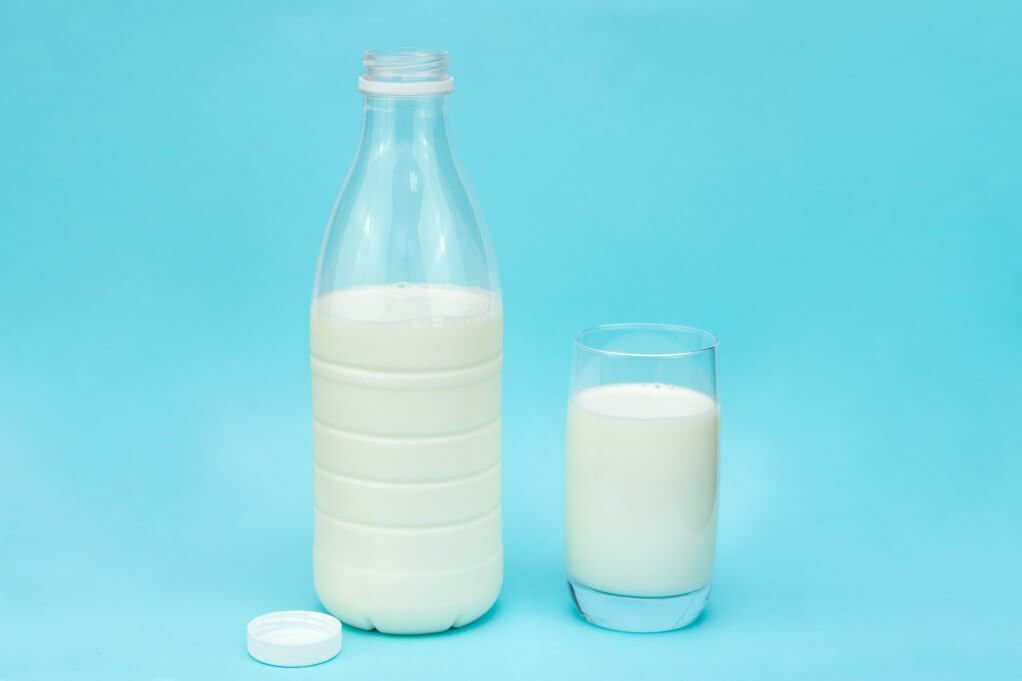
Calcium
In 2022, the U.S. Food and Drug Administration increased the amount of calcium it recommends people consume every day from 1,000 milligrams to 1,300 milligrams.
Luckily, without fortification, both oat and flax milk contain approximately 26 percent and 21 percent of that daily recommended value per eight ounces, respectively.
Oat milk wins out slightly in this head-to-head comparison if you’re looking for a milk beverage that provides more calcium.
Taste
For some people, choosing between oat and flax milk will simply come down to taste and texture.
Oat Milk Taste and Texture
Oat milk has a mild taste, with a hint of sweetness and richness that some say is similar to cow’s milk.
Oat milk also has a slight oat aftertaste, like the milk left after a bowl of cereal.
However, its taste is milder than soy or almond milk, which both have pronounced, easily recognizable flavors.
In terms of texture, oat milk is revered for its creamy, smooth palate that works well in coffee and tea.
At home, you can control the thickness of your oat milk by simply adjusting the oats to water ratio.
Some people emulsify their oat milk with oil or cocoa butter to bump up the creaminess and allow the oat milk to froth and even whip.
Oat milk's sugar content and slight sweetness make it an excellent ingredient for beverages and replacing milk in recipes.
Related: What Does Oat Milk Taste Like?
Flax Milk Taste and Texture
Flax milk tastes slightly nutty, though most describe the nutty flavor as mild.
Flax milk has no sweetness whatsoever and takes on a more earthy aftertaste than its oat milk counterpart.
While its texture is somewhat silky, flax milk is not nearly as creamy as oat milk. Some might even describe it as being on the watery side.
However, flax milk’s neutral profile makes it a great dairy replacement in more savory recipes because it won’t add sweetness like oat milk.
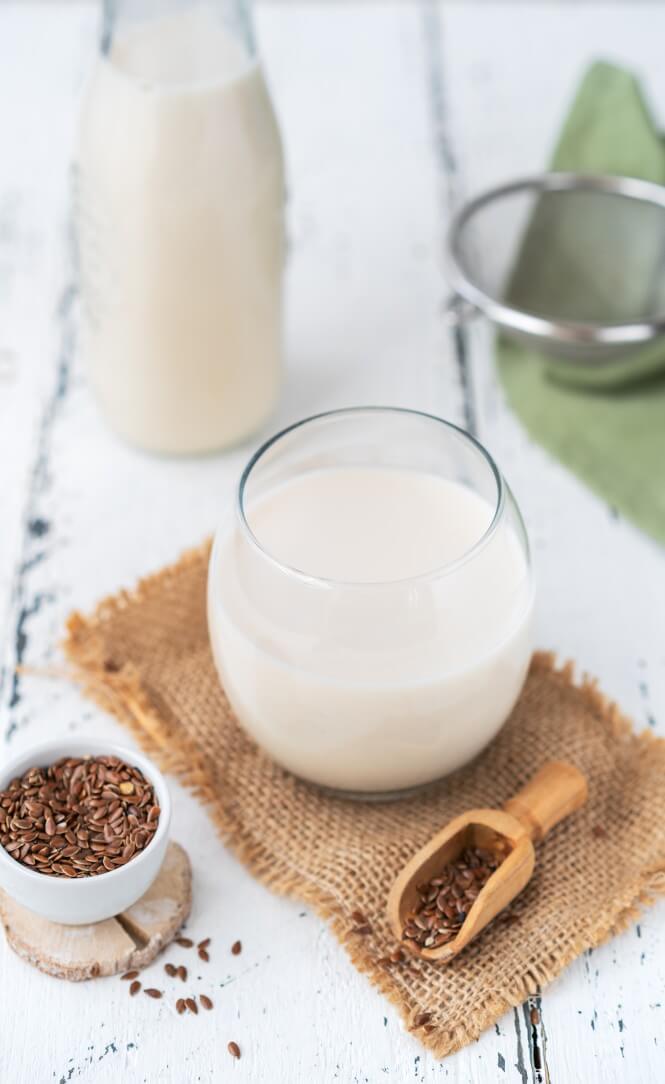
Oat Milk Pros & Cons
Now that you’ve seen how oat milk stacks up nutritionally compared to flax milk, it’s time to review some of the lesser-known pros and cons of consuming this dairy-free beverage to see if it’s right for you.
Pros
Oat milk is allergy-friendly.
It is a safe milk alternative for those who suffer from lactose, nut, seed, and soy allergies.
Even those suffering from gluten allergies can find certified gluten-free oat milk.
Related: Is Oat Milk an Allergen?
Oat milk provides nutrients.
Oat milk provides more iron and calcium than regular milk and is also a good source of vitamin B12, potassium, riboflavin, and vitamin A.
Getting enough calcium in your diet is vital to support healthy bones, skin, and teeth.
Meanwhile, iron is essential for women to support healthy red blood cell production and prevent anemia.
There’s around 10 percent, or .288 grams, of the recommended daily value in one cup of oat milk versus just .1 gram in milk. Dairy milk also inhibits iron absorption.
Related: Is Oat Milk Healthy?
Oat milk contains fiber and protein to keep you full longer.
According to the Mayo Clinic, fiber can also help lower blood cholesterol levels.
Oat milk has a creamy texture.
By making oat milk at home, you can also control this texture to make the oat milk more or less creamy, depending on your preferences.
It is an excellent substitute for dairy cream or artificial creamers in beverages such as coffee and tea.
Oat milk is widely available.
Consumers have clearly shown their preference for oat milk over almost every non-dairy milk alternative except almond milk.
For this reason, more coffee shops, restaurants, and grocery stores carry oat milk than other milks, making it a reliable staple item you can buy almost anywhere.
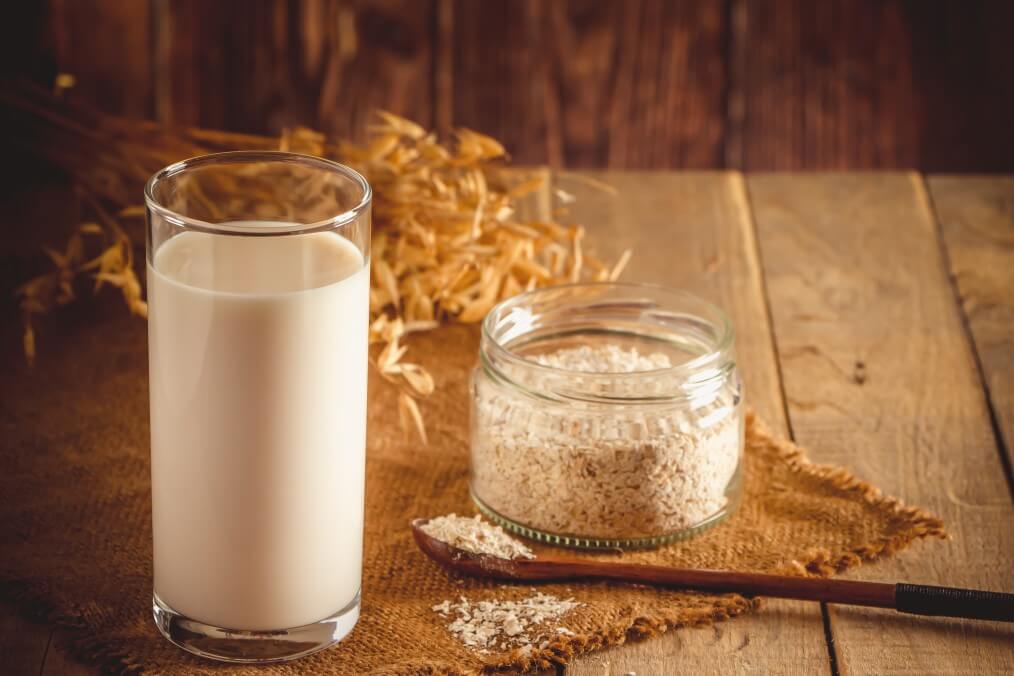
Cons
Oat milk doesn’t fit certain diets.
Due to its high calorie and carbohydrate count and relatively low fiber count in comparison, oat milk’s net carb count is high.
It is, therefore, not ideal for the ketogenic diet.
It’s also not considered a Paleo or Whole30-friendly ingredient.
Oat milk can be a risky proposition if you have gluten sensitivities or Celiac Disease unless it is clearly labeled “certified gluten-free.”
Oats are often processed in facilities that also process other grains, and cross-contamination is possible.
Store-bought oat milk contains fillers, gums, and preservatives.
Some store-bought oat milk brands add oil, Gellan Gum, Locust Bean Gum, Ascorbic Acid, and natural flavors.
To avoid these added ingredients, try making oat milk at home from just oats and water or buy oat milk made with simple ingredients.
Oat milk may contain pesticides like Roundup.
Some commercial oat farmers depend on glyphosate, also known as Roundup, to speed up the drying process of their crops.
Some people have filed lawsuits against Roundup, saying that the glyphosate causes cancer and other sicknesses.
Unfortunately, this chemical can end up in oat milk.
To avoid consuming Roundup-laden oat crops, look for store-bought oat milk that clearly states that the oats were grown without this chemical and are certified organic.
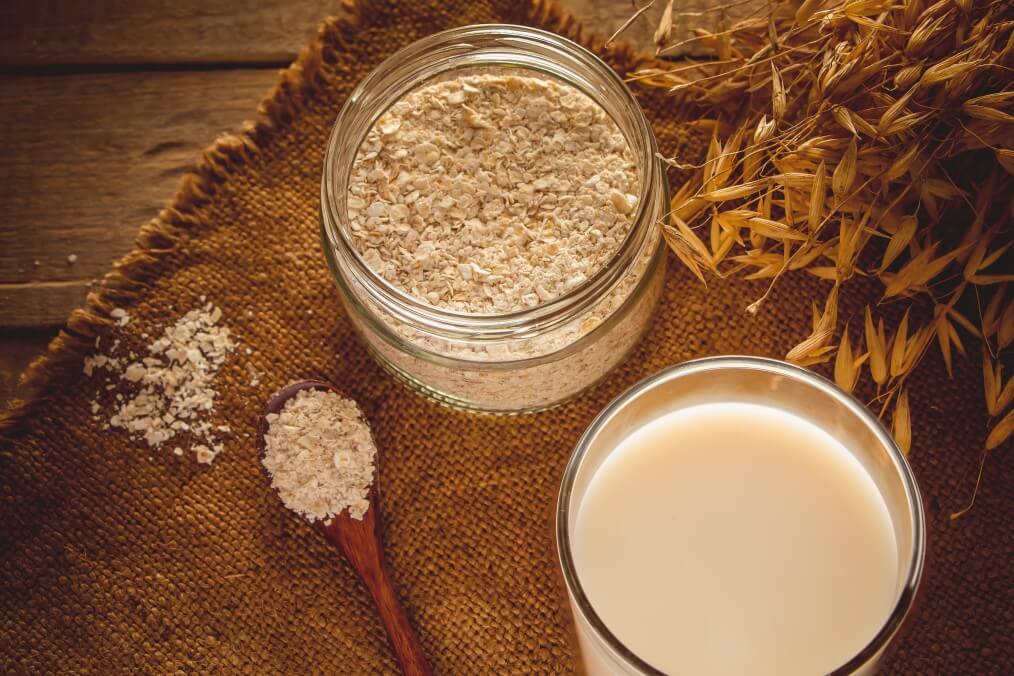
Flax Milk Pros & Cons
We’ve seen how flax milk stacks up nutritionally compared to oat milk, but there are other pros and cons to consider when deciding if flax milk is an appropriate beverage to include in your diet.
Pros
Flax milk is a good source of healthy fats.
It’s naturally rich in omega-3 fatty acids, a polyunsaturated fat that helps maintain a healthy body since they are the foundation of the structure of our cells. Omega-3s are also good for your heart, blood vessels, lungs, and immune system.
Fortified flax milk contains vitamin D.
When buying store-bought flax milk, you can choose a brand that fortifies its product with vitamin D. According to the National Institutes of Health, vitamin D is essential for strong bones, lowering inflammation, and regulating cells
Flax milk has a mild, non-sweet flavor.
It is an excellent alternative to dairy milk in savory recipes that call for a milk product because it won’t sweeten the dish or add unwanted flavor. It has only a slight nuttiness that is nearly undetectable when used as an alternative milk ingredient.
Flax milk is low in calories.
At just 25 calories per cup, with no sugar and only one gram of carbohydrates, flax milk is an excellent alternative to other plant-based milks for those watching their calorie and fat intake, or those who follow ketogenic, Whole30, or Paleo diets.
Flax milk is allergen-friendly.
For those who suffer from tree nut, soy, dairy, or gluten allergies, flax milk is a safe, healthy, and delicious option that fits their careful diets.
Flax milk is environmentally friendly.
Since flax seeds are grown in smaller quantities than oats, they require less water and less land to cultivate.
Cons
Flax milk is hard to find.
It’s a relative newcomer to the plant-based milk market, and since it’s not as nutrient-dense as some other non-dairy options, it is less popular among consumers.
For this reason, it will be harder to find flax milk at the grocery store and nearly impossible to request at a restaurant or coffee shop.
Flax milk is thin.
Compared to soy or oat milk, flax milk is very thin. While not as thin as rice milk, it is less suitable than other non-dairy milks for inclusion in beverages that demand a creamy addition. It is also challenging to successfully froth or whip, and will yield an icy result in dairy-free ice creams.
Flax milk is not a good source of protein or fiber.
While it may be conveniently low in calories, it is also low in these nutrients. It won’t keep you feeling satiated as long as milk alternatives with higher amounts of protein and fiber, and it won’t help you reach your recommended daily values for these nutrients.
Flax milk is more expensive.
Since it uses a higher-priced ingredient in its base and requires more flax seeds to make the milk, you will pay more.
You may also only find flax milk at specialty and health food stores, and those stores don’t have the buying power large grocery chains might have. So, the price goes up.
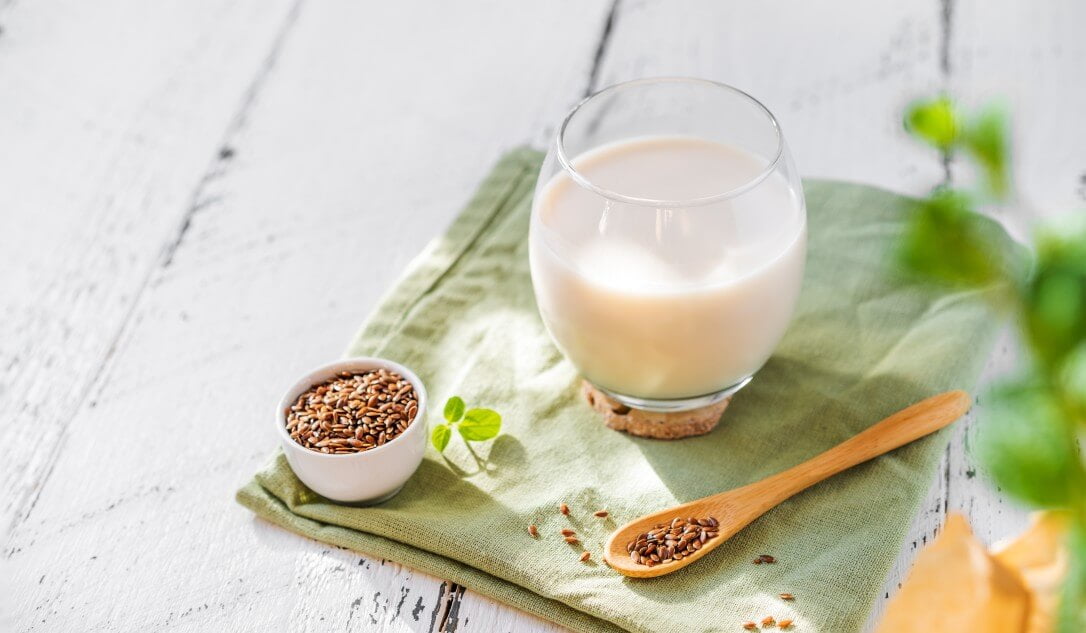
Oat Milk or Flax Milk?
In conclusion, to compare oat milk vs. flax milk, you’ll want to look at various factors that are important to you as a consumer.
Health, allergies, specialty diets, taste, availability, price, and environmental impact can all come into play in your decision.
While there’s no clear winner when comparing these two plant-based milk alternatives, both will yield a delicious beverage free from lactose and animal products. The final choice is up to you!
